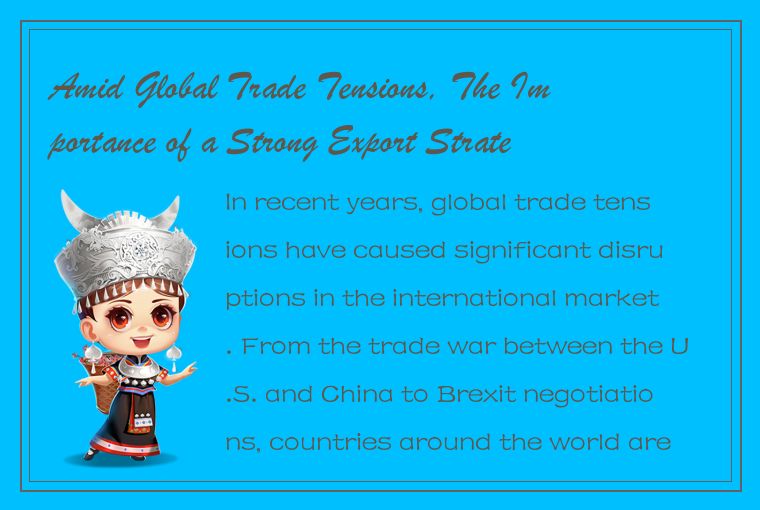In recent years, global trade tensions have caused significant disruptions in the international market. From the trade war between the U.S. and China to Brexit negotiations, countries around the world are facing challenges in maintaining their export competitiveness. Despite these challenges, one thing remains clear: the importance of a strong export strategy cannot be overlooked.

Exports are a critical driver of economic growth for countries around the world. According to the World Trade Organization (WTO), global merchandise trade volume grew by 3.6% in 2017, and trade in commercial services increased by 5.3%. In many countries, exports make up a significant share of GDP, with established economies like Germany, Japan, and China all heavily dependent on exports. Developing countries, such as Vietnam and Bangladesh, similarly rely on exports to drive economic growth.
A strong export strategy is essential to the success of businesses and countries in the global market. Here are some reasons why:
1. Diversification
A strong export strategy can help businesses diversify their customer base and reduce their reliance on domestic markets. By exporting goods and services to other countries, companies can tap into new markets and potentially increase their revenue streams. This can be especially important for small and medium-sized enterprises (SMEs), as they may have limited resources to compete in their home market.
2. Increased competitiveness
Exporting can increase a company's competitiveness by forcing it to improve its products, production processes, and marketing strategies. By competing in the global market, companies can learn from their international counterparts and develop innovative solutions to gain an edge over their competitors. Exporting can also provide access to cheaper inputs and raw materials, which can reduce production costs and increase profitability.
3. Economic growth
Exporting can drive economic growth by creating jobs, increasing productivity, and promoting investment. When companies export goods and services, they create jobs in their local communities and contribute to economic growth. Furthermore, exporting can encourage investment in research and development, which can lead to new innovations and increase productivity.
Amid global trade tensions, it is more important than ever for countries and businesses to prioritize their export strategies. Here are some key elements of a strong export strategy:
1. Market research
Before entering a new market, companies should conduct thorough market research to understand the needs and preferences of potential customers. This includes analyzing market trends, identifying competitors, and assessing regulatory requirements.
2. Competitive pricing
Competitive pricing is crucial for success in the global market. Companies must strike a balance between profitability and affordability to remain competitive. This may require adjusting prices based on local market conditions or developing more cost-effective production processes.
3. Strategic partnerships
Establishing strategic partnerships can help companies overcome common trade barriers, such as tariffs and regulations. By partnering with local businesses or investors, companies can gain valuable insight into the local market and access new customers.
4. Government support
Governments can play an important role in supporting export activities. This includes providing financial incentives, offering export training and education, and negotiating trade agreements to reduce trade barriers.
In conclusion, a strong export strategy is essential for businesses and countries to succeed in the global market. Despite the challenges posed by global trade tensions, companies that prioritize their export strategies can diversify their customer base, increase competitiveness, and drive economic growth. By conducting thorough market research, maintaining competitive pricing, forming strategic partnerships, and seeking government support, companies can develop a strong export strategy that will help them succeed in the global market.




 QQ客服专员
QQ客服专员 电话客服专员
电话客服专员